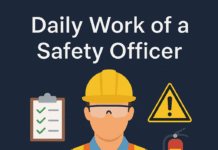
What is the Salary of a US Safety Officer?
Introduction
Safety officers play a crucial role in ensuring that workplaces remain safe and compliant with safety regulations. They are responsible for identifying potential hazards, implementing safety measures, and fostering a culture of safety. But how well are these professionals compensated for their important work? In this article, we’ll explore what a safety officer in the US can expect in terms of salary and the factors that influence their earnings.
What Does a Safety Officer Do?
A safety officer’s primary duty is to protect employees, property, and the environment from occupational hazards. They develop and enforce safety policies, conduct training programs, and ensure compliance with OSHA (Occupational Safety and Health Administration) regulations. Safety officers work in a variety of industries, including construction, oil and gas, healthcare, and manufacturing, where workplace safety is a critical concern.
Factors Affecting a Safety Officer’s Salary
Several factors influence the salary of a safety officer in the US. Understanding these factors can provide insight into how much you could potentially earn in this profession.
- Geographic Location: Salaries can vary significantly depending on the state or city where you work. For example, safety officers in metropolitan areas or high-demand regions typically earn more.
- Industry Type: The industry in which a safety officer is employed has a significant impact on salary. Those working in high-risk sectors, such as oil and gas, generally earn higher wages compared to those in education or public services.
- Experience Level: As with many professions, more experienced safety officers command higher salaries. Entry-level positions may start modestly, but salary growth is substantial with experience.
- Certifications and Education: Safety officers with advanced certifications, such as a Certified Safety Professional (CSP), can earn significantly more than those without. Higher education, such as a degree in occupational health and safety, also boosts earning potential.
Average Salary of a Safety Officer in the US
Salaries for safety officers vary based on experience, education, and location. Here’s a general breakdown:
- Entry-level positions: Safety officers starting out can expect to earn between $45,000 and $55,000 per year.
- Mid-level positions: With a few years of experience and possibly some certifications, salaries typically range from $60,000 to $75,000 annually.
- Senior-level positions: Senior safety officers or those in management positions can earn upwards of $90,000, with some reaching over $100,000 in high-demand areas or industries.
Highest Paying States for Safety Officers
Some states offer safety officers significantly higher wages than others. The top-paying states include:
- California: The average salary is around $85,000 annually.
- Texas: Safety officers can earn up to $80,000 per year.
- New York: Salaries hover around $78,000.
- Washington: Average earnings are approximately $77,000.
However, it’s essential to consider the cost of living in these states. Higher salaries might be offset by higher living expenses, especially in cities like New York or Los Angeles.
Salary by Industry
- Construction: Safety officers in construction typically earn between $60,000 and $80,000.
- Oil & Gas: This is one of the highest-paying industries, with salaries ranging from $70,000 to $100,000 or more, depending on location and experience.
- Manufacturing: Safety officers in this field earn between $55,000 and $75,000.
- Healthcare: Salaries are generally lower, around $50,000 to $65,000, but with a strong job outlook due to increased regulatory requirements.
Safety Officer Salary vs Other Related Professions
Safety officers’ salaries are competitive but can vary compared to other safety-related roles:
- Safety Engineers: Typically earn higher salaries, often ranging from $75,000 to $110,000.
- Safety Supervisors: Earn slightly more than safety officers, with salaries around $65,000 to $85,000.
Bonuses and Benefits
In addition to base salaries, safety officers may also receive bonuses, overtime pay, and other benefits, including health insurance, retirement plans, and paid time off. Bonuses are often tied to company performance, safety records, or project completion.
How to Increase Your Salary as a Safety Officer
- Certifications: Earning certifications such as CSP or ASP can significantly increase your salary.
- Continuing Education: Pursuing advanced degrees or taking specialized courses in safety management can lead to higher-paying positions.
- Industry Experience: Gaining experience in high-risk industries, like oil and gas or construction, often leads to higher wages.
Impact of Education on Salary
Safety officers with a bachelor’s or master’s degree in occupational health and safety or a related field generally earn more than those without. Advanced education can open doors to management roles with higher salaries.
Certifications That Can Boost Salary
- Certified Safety Professional (CSP): One of the most recognized certifications in the field, earning this can boost salaries by 10-15%.
- Associate Safety Professional (ASP): A stepping stone to the CSP, this certification also adds value to your resume.
The Role of Experience in Salary Growth
Experience plays a crucial role in salary progression. Safety officers with 10+ years in the field often see significant increases in salary, especially if they’ve worked in high-risk industries or taken on leadership roles.
Job Outlook and Demand for Safety Officers
The demand for safety officers is expected to grow over the coming decade, particularly in industries like construction, healthcare, and oil and gas. This high demand can lead to higher salaries and more job opportunities.
Challenges Faced by Safety Officers
Safety officers often face challenges such as enforcing compliance, handling resistance to safety protocols, and dealing with emergencies. These challenges can make the job stressful but also rewarding in terms of compensation and career advancement.
The salary of a Safety Officer in the United States can vary depending on factors like location, industry, level of experience, and education. On average, a Safety Officer in the U.S. earns between $50,000 and $75,000 per year. Here’s a more detailed breakdown:
- Entry-level Safety Officers: Typically earn around $45,000 to $55,000 annually.
- Mid-level Safety Officers: With a few years of experience, the salary can range from $55,000 to $70,000.
- Senior Safety Officers: Those with extensive experience or specialized certifications (such as CSP – Certified Safety Professional) can earn upwards of $70,000 to $90,000 or more.
- Top-paying industries: Safety Officers working in sectors like oil and gas, construction, or manufacturing may have higher salaries due to the high-risk nature of the work.
Salaries also vary by state, with higher pay typically found in areas with a higher cost of living, such as California, New York, or Texas.
Conclusion
Safety officers play an indispensable role in maintaining workplace safety across various industries. While salaries can vary based on factors such as location, industry, and experience, the profession offers competitive pay, especially for those with certifications and advanced education. As the demand for safety officers continues to grow, so too will the opportunities for higher salaries and career advancement.
How to Become a Safety Officer in the USA?
What Does a Safety Officer Do in the Workplace?
What Is the Role of a Safety Officer in the Workplace?
Which Degree is Best for Safety?
How to Become HSE Manager Without a Degree
FAQs
- What is the average salary of a safety officer in the US?
The average salary ranges between $60,000 and $75,000 annually, depending on experience and industry. - How does certification impact a safety officer’s salary?
Certifications like CSP or ASP can increase a safety officer’s salary by 10-15%. - What industries pay the highest salaries for safety officers?
The oil and gas industry tends to offer the highest salaries, followed by construction and manufacturing. - Can a safety officer earn more with additional certifications?
Yes, certifications such as CSP and ASP can lead to significant salary increases. - What is the job outlook for safety officers in the US?
The job outlook is positive, with increasing demand across industries like construction and healthcare.
























